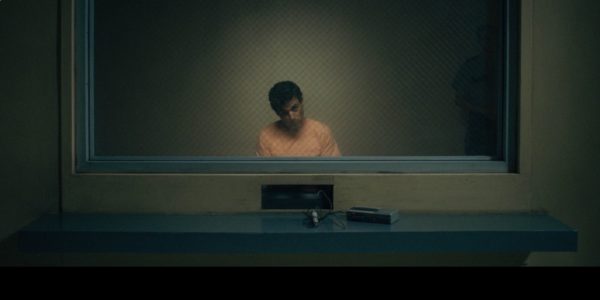
Based on a series of interviews, No Man of God follows real life criminal profiler Bill Hagmaier (Elijah Wood)’s relationship with Ted Bundy (Luke Kirby), as the pair met regularly for the last few years of the latter’s life as he awaited execution in a Florida State Prison.
The film follows the events from their first meeting in 1985 through to the hectic last week of Bundy’s life in 1989 as investigators rushed to get closure from him about unsolved murders before he was killed in the electric chair.
Due to Bundy’s imprisonment, No Man of God is defined primarily by its fixed geography: the film is mostly set in a few sparse interview rooms in the Prison. It’s a talky film, featuring mostly conversation between the two leads, with a few supporting characters such as Bundy’s Civil Attorney Carolyn Lieberman (Aleksa Palladino). The bulk of the film rests on its two leads, however, and while Kirby and Wood are both solid, the film is still comprised mostly of static interviews across a table.
Director Amber Sealey keeps the camera moving throughout rather than rely solely on traditional shot-reverse shots of the men talking. She favours slow pans that alternate between each man’s perspective to mirror their verbal banter, and even includes unusual angles, such as framing Bundy’s introduction through a bend in Bill’s arm, to maintain visual.
Screenwriter C Robert Cargill is most interested in the points of intersection between the two men, pushing hard on the idea that in another life Bill could be hunting women while Bundy profiled the crimes. This complements Bundy’s metaphor of the Feds fishing for various sized fish (ie: predators) that they are unable to catch because they are unable – or simply unwilling – to descend into the depths with their prey. Several times throughout No Man of God Bundy states that he sees the same killer instinct in Bill and that he will take the profiler “under the water”, a lingering suggestion that anticipates the seductive bond that develops between them..
At its core, No Man of God questions how much of himself Bill is ready to lose in his pursuit of “understanding” a man like Bundy. Over the years, via the face to face interviews and the letters they exchange, Bill comes to understand the inmate better than anyone else, to the point that when Bundy’s stay of execution is rejected, Bill is identified by various players as 1) Bundy’s best friend, 2) the scheduler of all of his interviews and, most importantly, 3) the man who will decide if Bundy’s hail mary insanity defense is accepted or rejected.
It’s a murky moral slope…and yet No Man of God never manages to convey that Bill is anything other than good. Conflicted, yes, but there is no question that he believes Bundy is guilty and deserves to die.

The film, unlike several other projects that have come out in the last few years, never idolizes the killer, though. No Man of God’s take on the famed killer is that Bundy is smart, attractive and charismatic; he’s also prone to violent outbursts, he’s manipulative and he’s clearly an individual who doesn’t respect human life.
Bill’s fascination with the killer, however, never quite translates to the audience. Cargill’s script dedicates a significant amount of time to the interplay between the two, but it’s never clear if Bill is truly becoming enthralled with his subject and the darkness that lurks within good men (minus the climax, which uses framing, dialogue and editing to lean hard into the idea of a shared symmetry between the two men).
Alas No Man of God loses energy long before the end of its hour and forty minute runtime. This is due, in part, to its inevitable end (the film opens with archival news footage of Bundy’s death), but moreso because there’s no revelatory take-away. No Man of God fails to offer anything new to Bundy’s well-documented narrative, but more significantly, it fails to give meaning to Bill’s experience (which, as the post-script focusing on Bill’s career indicates, is the film’s true purpose).
Despite solid performances and elegant direction, an overwhelming feeling of familiarity pervades No Man of God. The film is covering the same ground as countless other films and television series depicting the early work of police profilers, most recently David Fincher’s Mindhunters, which covers roughly the same time period and employs a similar cool blue and grey colour palette.
Bill is clearly good at what he does, and he makes a connection with Bundy because he’s willing to go beneath the surface to forge a connection with him, but that’s all that No Man of God has to offer. Between the title of the film, Bill’s reliance on prayer to help guide his actions and his prioritization of work over family, No Man of God wants to say something meaningful about the sacrifices it takes to get this job done. The reality is that it’s a perfectly fine film that’s simply not that deep.
3/5
No Man of God played at the 2021 Tribeca Film Festival.
